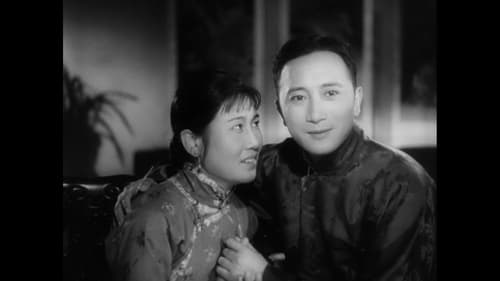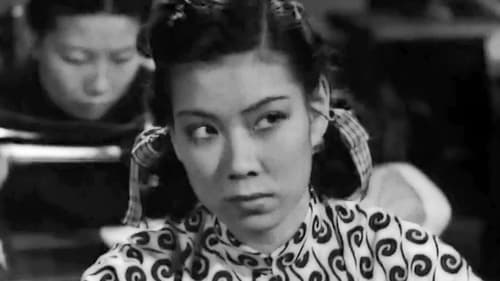
2nd Brother
Upon the death of an elderly master, a family has a dispute over the distribution of an inheritance / jewelry and are haunted by ghosts.

Cold Nights features great performances by both Pak Yin as a tough minded “new woman”, Shusheng, and Ng Cho-fan as her weak husband, Wang Wenxuan, whose spirits have been crushed by the Sino-Japanese war.

Ko Hak-ting
Hak-ming heads the Ko Family, but he and his brothers, Hak-ting and Hak-on, and the second wife of the late Master Ko quarrel. Young Cousin Mui, who has tuberculosis, is forced by to marry an older woman. Kok-sun is guilty of being unable to stop the marriage. Sun and maid Chui-wan are wary of their feelings for each other due to class difference. Cousin Mui dies of illness. Hak-ting has his eyes on Wan. His wife, Wong, complains to their daughter, Shuk-ching, who cannot take it and commits suicide. Wong blames herself for her death. Undergone these tragedies, Cousin Kam's mother let Kam have a modern wedding with Kok-man. When Ming is ill, Ting and On want to sell the ancestral home. Hak-ming dies of angst. When the fifth uncle of Sun forces Wan to be his concubine, Wan tries to kill herself but is intercepted by Sun. Pressurised by people of the house over the issue of inheritance, Sun protests by declaring his love for Wan and leaves the family, with his mother, brother Man and Wan.

Old Lee/ Neighbour
After seeing a friend of his boss' son adopted over his promised promotion with connections, Shrimp's father, a minor white-collar worker Ng Kwun-sing, vows to get Shrimp a place in a prestigious school and a chance to make friends with the rich. However, Shrimpy is constantly bullied and discriminated against by his classmates. Ng has not the means to be a social climber and finally realises his mistake. He sends his son to a voluntary school so that he may grow up happily. This poignant father-son drama shows a parents' willingness to carve out a good future for their children by any means necessary.

Ng's colleague
After seeing a friend of his boss' son adopted over his promised promotion with connections, Shrimp's father, a minor white-collar worker Ng Kwun-sing, vows to get Shrimp a place in a prestigious school and a chance to make friends with the rich. However, Shrimpy is constantly bullied and discriminated against by his classmates. Ng has not the means to be a social climber and finally realises his mistake. He sends his son to a voluntary school so that he may grow up happily. This poignant father-son drama shows a parents' willingness to carve out a good future for their children by any means necessary.

Ko Hak-ding
Ko Suk-ying is saddened over her arranged marriage as manipulated by her father Hak-ming. Ko Kok-sun's Cousin Chow Wai's spends the Mid-Autumn Festival before her marriage with the Kos. She has been in love with Sun. Sun finds out about her love for him when she is about to be married off, he is too weak to oppose to Wai's betrothal to another man. Sun's son, Hoi-sun, falls ill. Fearing the displeasure of his elders, Sun dares not consult a western doctor.
Meanwhile, another dispute arises among members of the family over the ancestral land. When accused of being incompetent in his management, Sun takes the blame silently. Wai dies of grief while Hoi-sun becomes a victim of mistreatment. Sun is devastated at this double blow.
Hak-ming instructs Sun to arrange for Ying's wedding. Knowing the kind of man Ying's fiancee is, Sun is reluctant. Not wanting to follow in Wai's footsteps, Ying fights for her own rights, and backed by an enlightened Sun, she leaves for a new start.

Ko Hak-ding
"Family" (1953), which launched the Union Film legacy, "Spring" (1953) and "Autumn" (1954) are adaptations of Ba Jin's highly regarded novel "Torrent Trilogy". In "Family", director Ng Wui skilfully condenses the voluminous first part of the novel into an emotionally powerful and intellectually focused story of youngsters struggling to survive oppression and repression in a feudalistic family. This well-received film quickly established the company's reputation.

Chinese Opera from Hong Kong directed by Chun Kim.

The sophistication of 1950s Hong Kong cinema is vividly illustrated in this film of limited budget and resources. Cantonese opera star Sun Ma Si-tsang plays a country boy who looks exactly like Sun Ma and is asked by a rich girl to impersonate the star, to help her stage an opera. The self-reflexive humour generated by the absurd situation not only provides delicious parody of celebrity culture but also comments subtly on class inequality and the perils of urbanisation. Sun Ma, who also appears as himself in a stage performance, is complemented beautifully by the brilliant comedian Yee Chau-shui as his sidekick and Hung Sin Nui, another opera superstar, as the spoiled and precocious rich girl.

Big Uncle
When both sides of the family move in with a married couple, chaos reigns.

A 10-year-old Bruce Lee stars as Kid Cheung, an orphan boy who sells comics in a little stall in the slums to survive. He and his two siblings are looked after by his Uncle Ho, a teacher. When the wealthy Hung Pak-ho surveys the slums to build a school for orphans, he is robbed by the vicious Blade Lee and his gang. Cheung helps Blade Lee escape and earns his friendship, but Uncle Ho convinces him to return the gold necklace Lee stole. Hung rewards Ho by hiring him as his private secretary.

Drama from Hong Kong directed by Wong Toi.

A swordswoman joins hands with fellow warriors to save her son from the evil monk.

Cheung Chi-Kai
Describes how a Chinese village is invaded by the Japanese and how the villagers organise a guerrilla group to resist the enemy. With the aid of anti-war Japanese soldiers, the guerillas defeat a whole regiment of Japanese troops.

A group of guerrillas fighting against Japanese invaders.

Hong Kong ghost / horror.

Chan Sing-Yan
A rural employee leaves his wife and mother to seek work in the city.









